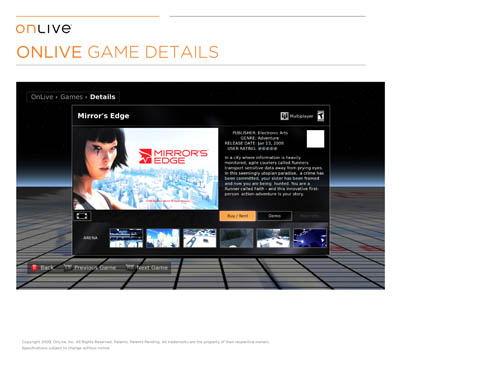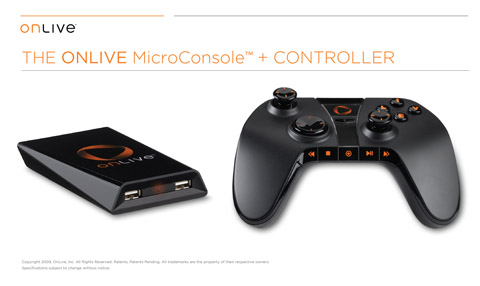
A new online gaming service called OnLive was announced this week at the Game Developers Conference (GDC), promising a new way to play video games via digital distribution, but will it undermine the hardware based consoles?
Instead of worrying about keeping that tricked out gaming rig up to spec, or having a big old console sitting under your TV, OnLive actually runs the games on their own servers and streams the video to you through a 1Mb browser plug-in for your computer or a “microconsole” hooked up to your monitor/HDTV. They also have a very Xbox 360-like wireless control to control the games (though I’m guessing that keyboard and mouse support will be there too), and promise a number of online community features, such as being able to watch others play a match without owning the game, their own version of achievements and much more.
Pricing for games will include a combination of subscription and purchase options, which offers a lot of flexibility, with a number of big name game developers already signed on, such as EA, Take Two Interactive, Warner Brothers, THQ and Eidos.
The idea of being free of the hardware hassles of keeping up with the Pwnses is may be liberating, though it may come with a price.
“OnLive is the most powerful game system in the world. No high-end hardware, no upgrades, no endless downloads, no discs, no recalls, no obsolescence,” said Steve Perlman, Founder and CEO of OnLive. “With OnLive, your video game experience is always state-of-the-art.”
[OnLive]
According to OnLive’s President and CEO Steve Perlman, to get the maximum image quality of 1280 x 720, you’ll need about 4 megabits worth of bandwidth, with image quality dynamically scaling back when bandwidth decreases, which would be more than a little annoying when fighting of hordes of the infected in Left 4 Dead. In comparison, a 2+ year old system with a low end Core 2 Duo E6300 (1.86 GHz) and a similarly old Nvidia 7950 can run the same game at 1920 x 120o (the equivalent of 1080p).

Graphics quality isn’t the only question raised by the OnLive system.
The bandwidth requirements work out to be over 1.4Gb per hour, which is equal to downloading a full copy of the game in after about 3 hours of play. In comparison, online games takes up much less data, in most cases by a factor greater than 10.
Now you’ll be fighting for that bandwidth in much the same way you used to fight for control of the remote, or both suffer the pixelated consequences, even if you’re playing a single player game that shouldn’t require any bandwidth at all. Imagine your ISP being down, so you can’t finish off the final level of Prince Of Persia.
That would be more than a little irritating.
In short, I doubt that Mr. Perlman’s goal of unseating console hardware is going to happen. Gamers already used to 1080p or greater gaming experiences are not going to give up hardware for what will be an inferior visual experience that is tied to bandwidth.
It’s not the OnLive product, but the dependence on the availability of real broadband from ISPs who are slow to upgrade network services, while enforcing ridiculously low monthly caps.
Don’t get me wrong, as OnLive looks like it could be a decent supplement for the ‘hardcore’ gamer, and may also be an entry point for people looking for something more than a Wii with a lower barrier to entry than a PS3, Xbox 360 or gaming rig. With the video game industry continuing to experience solid growth every year, there’s more than enough room for OnLive, without the ‘hardware is dead’ hyperbole.
Originally posted @ rgbFilter